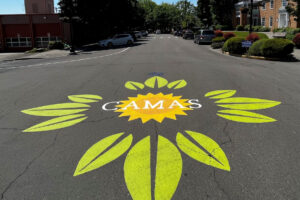A former Camas mayor is being accused of stealing nearly $15,000 worth of public funds and could face criminal charges.
The Camas Police Department recently concluded a criminal investigation into former Camas mayor and Camas-Washougal Economic Development Association (CWEDA) director Paul Dennis.
In a report forwarded last week to the Clark County Prosecutor’s Office, Camas police investigators conclude that Dennis, 50, who ran CWEDA from 2011 to 2019, stole nearly $15,000 from the association over a seven-year period.
Founded in 2011 to help bring new businesses and industry to East Clark County and pull Camas-Washougal out of the recession, CWEDA depended on funding from three public entities and received $100,000 a year from the Port of Camas-Washougal, $50,000 a year from the city of Camas and $50,000 a year from the city of Washougal.
Dennis, who had stepped down from his role as Camas’ mayor after being named CWEDA’s chief executive officer in 2011, earned a monthly salary of $9,700.
But Camas police investigators say the annual $116,400 salary was not enough for Dennis. Instead, police have accused the former mayor of supplementing his pay with CWEDA funds, spending public money on everything from hotel stays in San Francisco and car parts for his classic Ford Mustang to “excessive” food and drink purchases.
“I believe the investigation shows there is probable cause for (first-degree) theft for Paul Dennis,” Camas Police Detective Brian Salwasser states in the police report. “The investigation clearly showed (Dennis) made nearly ($15,000) worth of personal purchases with public money.”
Investigators say the misuse of funds came to light after CWEDA leaders realized the association was a public entity subject to “an imminent audit by the State Auditor’s Office.”
Washougal Finance Director Jennifer Forsberg, who had worked as a fraud investigator for the state auditor from 2001 to 2010, was in charge of that audit. Police say Forsberg was the person who first noticed that Dennis had used CWEDA money for what seemed to be several personal purchases.
Police say they wanted to allow the state audit and fraud investigation to conclude before starting a criminal investigation. The state auditor’s office completed their work in January and Camas police began their criminal investigation into Dennis’ alleged theft.
In Camas police records obtained Monday by the Post-Record, investigators outline their case against Dennis and include interviews with several prominent Camas-Washougal officials and city leaders, including Washougal Mayor Molly Coston, former Camas Mayor Scott Higgins, former Washougal Mayor Sean Guard, Port of Camas-Washougal Commissioner Larry Keister, former Camas Administrator Pete Capell, Washougal City Manager David Scott and the Port’s chief executive officer, David Ripp.
“We just find it disappointing that it had to go to this level,” Coston said Monday.
Ripp agreed.
“When all of this came out, I was just very surprised,” Ripp said. “I don’t know the circumstances and haven’t seen the report … but I’m really disappointed. I just don’t know what (Dennis) was thinking. I’m saddened and frustrated, but there is anger, too.”
In interviews with witnesses, Camas police detail the findings of the audit and ask those who knew Dennis on a professional level to help explain the suspicious purchases.
According to the police report, Forsberg said she first became suspicious of Dennis in March 2019, after noticing what she believed were “excessive” purchases for gas and coffee using CWEDA funds.
“She also saw a purchase from Les Schwab (for about $1,400) and saw no documentation or corresponding deposit to offset the purchase,” the report states, referring to Forsberg’s audit of CWEDA funds.
Due to a shift in 2017, when CWEDA went from being viewed as a private organization to a public association in need of state audits, Forsberg had a difficult time accessing older bank statements. The new statements, however, according to the police report, showed more transactions described by Forsberg as “suspicious,” including “a GameStop purchase at Christmas, PetSmart, several Mustang parts purchases” and gas charges during a father’s weekend at Washington State University in Pullman, Washington, where the police report notes Dennis’ daughter attends school.
Included in the police report is a list of personal purchases investigators allege Dennis made using public CWEDA funds. These include: $110 at PetSmart; $249 at GameStop; $589 at the Palace San Francisco hotel; more than $1630 for Les Schwab, $948 at a Mustang restoration business called CJ Pony Parts; $1,800 for vehicle transport; nearly $70 at Home Depot; several hundred dollars for food at locations such as Top Burger, Buffalo Wild Wings, Red Robin, Old Spaghetti Factory, Wendy’s and Starbuck; and nearly $3,700 to a PayPal account marked as “CREED,” which investigators are still trying to figure out but say could be connected to a high-end perfume vendor.
Asked about the suspicious purchases, Dennis — who did not respond to the Post-Record’s request for comment in time for this article’s publication — told police investigators he could not remember the PetSmart purchase, writing a check to a vehicle transporting service or setting up a PayPal account to pay the “CREED” vendor.
When investigators pointed out the Mustang-related purchases, Dennis “admitted he has a classic ‘67 Ford Mustang Fastback, but (said) he did not recall transporting it (or) purchasing parts for it,” the police report states. “It took several questions to get there, but (Dennis) did remember going to Pullman in November 2018 to visit his daughter at WSU for dad’s weekend, where he filled up his gas tank twice and purchased coffee. He could not remember if a CWEDA business meeting coincided with that trip.”
Dennis instead told investigators he had paid himself less following any personal purchases he may have made using CWEDA funds, but police say the audit did not show this to be true.
“According to (Fosberg’s audit, Dennis) was paid $9,700 a month when finances were netted out,” the police report states.
Other former mayors weigh in on allegations
In 2011, after being selected from seven applicants to lead CWEDA through his Cascade Planning Group, Dennis stepped down from his role as Camas’ mayor.
“We feel we have selected the person who can hit the ground running and bring us results,” then-Port Commissioner Mark Lampton told the Post-Record in 2011 after announcing Dennis would lead the newly formed economic development association. “We are really confident in this decision to hire Paul. This has been an open and honest process. Anybody could have applied.”
At that point, Dennis had been Camas’ mayor for nearly eight years. served on the Camas City Council for six years and worked in economic development since 1990. He formed his own company, Cascade Planning Group, in 2003.
When Dennis stepped down from his mayoral position, then-mayor pro tem Scott Higgins took over leadership of Camas. Higgins would go on to serve as Camas’ mayor until his unexpected retirement from city politics in 2018.
Interviewed by Camas police investigators in February, Higgins said he put a lot of trust in Dennis’ ability to run CWEDA and manage the group’s finances.
“(Higgins) went on to say he has been shocked to hear of some of the expenditures (Dennis) made and called them ‘stupid decisions,’” the police report states.
Higgins also told police that Dennis was “sloppy with his personal finances” and recalled a time when the two men had purchased season tickets to the Portland Timbers. Higgins said he had written Dennis a check for about $1,000 to cover his half of the tickets, but that Dennis did not cash the check for eight months.
“(Higgins) would check in with (Dennis), but (Dennis) would say he had not gotten around to it yet,” the police report states.
Told that police suspected Dennis of stealing $15,000 in public funds, Higgins told police he wouldn’t “be surprised to hear (Dennis) mistakenly spent that much money with CWEDA funds due to his sloppiness,” but later said he couldn’t see why Dennis would spend CWEDA money on purchases at places like PetSmart, GameStop or at Mustang restoration shops.
Another former East County leader, former Washougal Mayor Sean Guard, also weighed in on the allegations against Dennis during a police interview conducted in late February.
Guard had pushed for the formation of an East Clark County economic development group and sat on the original CWEDA board with Higgins.
In his interview with police investigators, Guard said Dennis should have only spent CWEDA funds for food and drinks if he was “specifically meeting with someone for CWEDA purposes.”
Asked if it was “reasonable” for Dennis to take CWEDA clients to places like Burger King and Subway, two of the restaurants that appeared on the list of suspicious charges, Guard said “he did not believe it was a place he would take a client unless that was a place the client really wanted to go.”
As the interview concluded, investigators asked Guard why they thought Dennis had stepped down from his position with CWEDA in 2019.
According to the police report, Guard, who had experienced his own political-career-ending scandal and police investigation in 2017, told investigators he believe Dennis’ “world was crumbling around him, and once the audit was imminent (Dennis) knew it was going to come out (that) he committed fraud or theft.”
CWEDA to disband in June
The cities of Camas and Washougal, along with the Port, announced in December 2019 that they were planning to disband CWEDA in June 2020.
Ripp said the end of the association had nothing to do with the investigation into Dennis’ misuse of public funds.
“CWEDA was good. It was successful. And it brought us out of the recession,” Ripp told the Post-Record on Monday. “We had several new businesses that came in and new projects in the double digits. But CWEDA ran its course. The Port had grown so much, and we were at the point where we wanted to take those (CWEDA) funds and focus them more on Port business.”
Former Camas city administrator Pete Capell said in December 2019 that the Port and city of Camas wanted to continue to collaborate for economic development in East Clark County, but did feel the need to do that through CWEDA any longer.
“I think a key message is the mutual interest in cooperative economic development between the two cities and the Port is not diminished. It stays right where it’s at,” Washougal City Administrator David Scott said in early December 2019.
Washougal Mayor Molly Coston said Monday that local city leaders were waiting until June to fully disband CWEDA and were trying to “find a different strategy for economic development” in East Clark County.
Of the allegations against Dennis, Coston said she was disappointed and that city of Washougal officials hoped to see the complete CWEDA audit within the next couple weeks.
“The whole thing is regrettable on all fronts” Coston said.



